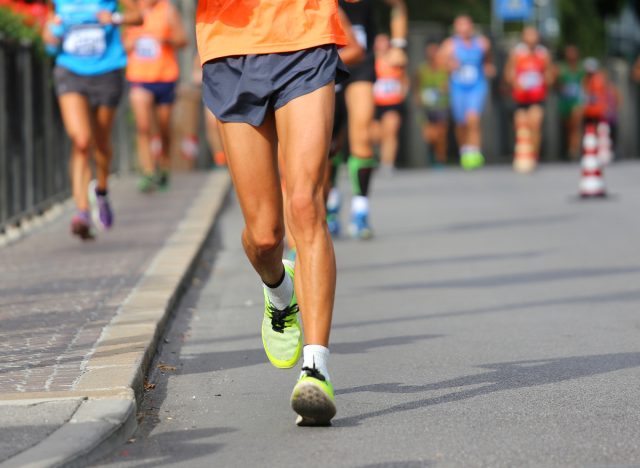Many athletes, whether they are long-distance runners, cyclists, swimmers, or individuals aiming to enhance endurance, are familiar with the concept of “carb loading.” This technique aims to improve athletic performance by maximizing the stored energy in the muscles. By increasing carbohydrate intake in the days leading up to a significant training session or event, athletes can delay fatigue, improve stamina, and potentially achieve better results. We spoke with an expert who simplifies everything you need to know about carb loading and how you can begin.
How Does Carb Loading Work?

According to The Nutrition Twins®, Tammy Lakatos Shames, RD, CDN, CFT, and Lyssie Lakatos, RD, CDN, CFT, members of our Medical Expert Board, “Carb loading is a nutrition strategy predominantly used by athletes to manipulate the glycogen levels (stored carbohydrates) in the muscles to enhance performance. Typically, athletes increase their carbohydrate intake beyond their usual consumption while reducing their exercise intensity, allowing the muscles to store more energy for optimal performance during competitions.”
What Types of Athletes and Physical Activities Benefit Most From Carb Loading?

Carb loading is particularly advantageous for endurance-based sports and activities that demand high levels of muscle energy. Athletes may implement carb loading before embarking on a long run, swim, or bike ride, participating in a marathon, or completing a triathlon. “In general, this technique is beneficial for any endurance athlete competing for longer than 90 minutes,” explain The Nutrition Twins.
How to Properly Carb Load

There are various types of carb loading, but The Nutrition Twins point out that all are completed in the days before a major event. If you carb load less than three days prior to your competition, this strategy will be ineffective.
“Start three to six days out from your competition. Each day, increase your carb intake, maxing out to 70% to 90% carbs, three days before your event,” The Nutrition Twins instruct. “Choose a mix of nutrient-rich carbs like sweet potatoes, regular potatoes, oatmeal, and whole grains, as well as pasta, rice, and bread. Your body will benefit from the fiber, which will help keep you regular the days before the competition, as well as from the antioxidants that will help to tame inflammation before, during, and after the race.”
Be sure to consume a solid combination of whole-grain carbs, bread, rice, etc., to avoid having too much fiber the day before your competition. In addition, stay away from sugar-packed or refined carbs that can wreak havoc on your blood sugar.
Frequently Asked Questions about Carb Loading and Physical Performance
What is carb loading?
Carb loading is a strategy used by athletes to increase the amount of fuel stored in muscles in preparation for endurance events. It involves consuming a high-carbohydrate diet in the days leading up to the event to maximize glycogen stores.
How does carb loading work?
Carb loading works by increasing the glycogen stores in muscles and liver. These glycogen stores are a crucial source of energy during prolonged physical activity, such as marathon running or cycling.
When should I carb load?
It is recommended to start carb loading 2-3 days before a long endurance event, such as a marathon. This allows enough time for your glycogen stores to reach their maximum capacity.
What foods are good for carb loading?
- Pasta
- Rice
- Potatoes
- Oatmeal
- Quinoa
- Bananas
Can carb loading really boost physical performance?
Carb loading can help improve physical performance during endurance events lasting more than 90 minutes. By maximizing glycogen stores, athletes can delay fatigue and potentially improve their overall performance.
Are there any risks associated with carb loading?
While carb loading can be beneficial for endurance events, consuming excessive carbohydrates can lead to weight gain and digestive issues for some individuals. It’s essential to find the right balance and experiment with carb loading during training to see what works best for you.






